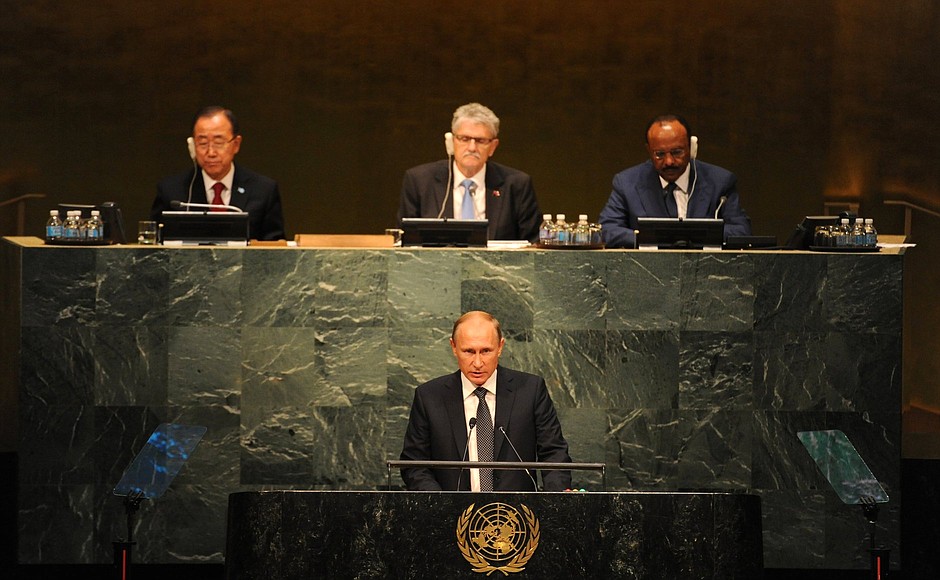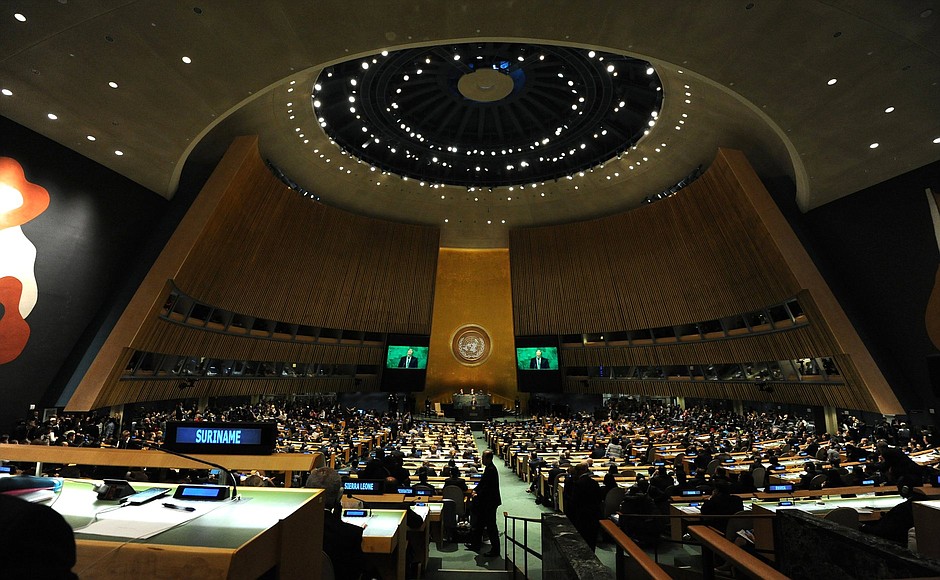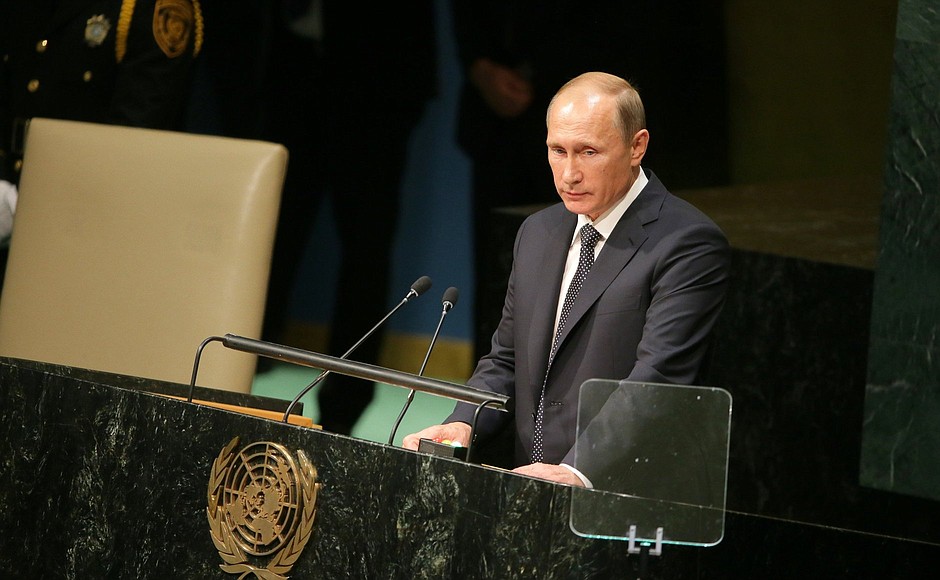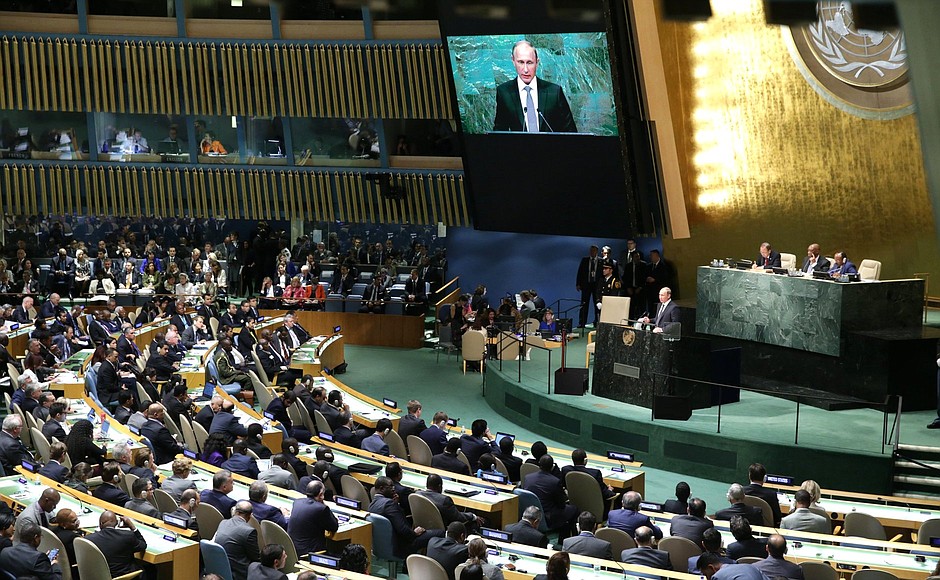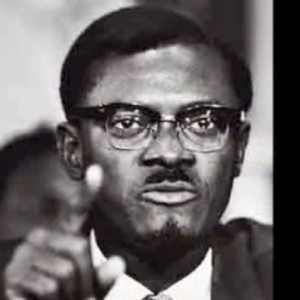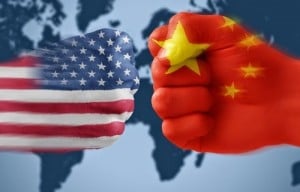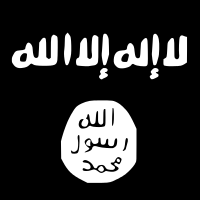The “victory” of the globalist “Left” in Greece
The second victory of SYRIZA in Greece within eight months was celebrated by many in the European and US “Left” as a victory for the Left in general, following its almost total political and ideological bankruptcy of the last two decades or so.
That is, the kind of “Left” which takes for granted neoliberal globalization and simply objects to neoliberalism but not to globalization itself, deceiving the victims of globalization that there could be an alternative “good” globalization within the system of the capitalist market economy. The well-known slogan of the Social World Forum “Another World is Possible” summarizes this deception, which was adopted not only by SYRIZA in Greece and PODEMOS in Spain but, lately, even by the new leader of the British Labor Party, whose Shadow Chancellor just repeated this slogan in the Labor Party Conference.[1] Of course, both the Labor Party leader as well as his Chancellor are characterized by the British establishment as ‘radical Left’, in the same way as Tsipras, Varoufakis, Tsakalotos and the rest of SYRIZA intelligentsia, a party which just managed one of the biggest political sell-outs in decades, are characterized as Marxists by the elites and the controlled by them mass media. However, before we come to the big deception by SYRIZA we have to deal briefly with the globalist “Left” which today is dominant, from North America (Chomsky, Albert, Panitch, etc.) to Europe (Zizek, Piketty, Die Linke, et.al.) –all of whom have supported SYRIZA, even after the big sell-out.
For all those in the globalist “Left”, what matters is just the fact that a party calling itself Left took power, irrespective of the policies it followed in the past and is committed to follow in the future. What matters instead is holding power for power’s sake –a philosophy which has dominated the British Labor party since its repeated victories under the war criminal Blair, who led to the criminal wars in Iraq and Afghanistan, and then, in opposition, to their support for the similar campaigns in Libya and Syria. At the same time, British workers have been forced through zero hours contracts, etc. (which globalization brought about!) “to stomach the biggest real-terms pay cut since the Victorian era”,[2] while most working class achievements of the 20th century have been reversed, including the gradual degeneration of the welfare state, proudly introduced by the Labor party in 1945. Yet, all that matters for all of them in the globalist “Left” is that the Left is in power and everything else will somehow be sorted out— a kind of mentality, which has already led to the inexorable rise of neo-nationalist movements fighting for economic and national sovereignty, a goal that has been abandoned by the globalist Left.
The international globalist “Left”
Today’s international left –apart from a few notable exceptions at the theoretical level[3] and, at the political level, the anti-systemic Left contesting the New World Order (NWO) and its institutions such as the EU, NATO, etc. (e.g. the Communist Party in Greece)—it is fully integrated into the NWO of neoliberal globalization. That is, the international globalist “Left” does not question neoliberal globalization and the open and ‘liberalized’ markets which it takes for granted, let alone its institutions. On the contrary, it fully disorients the popular strata and particularly the working class, who are the main victims of the NWO, that it is supposedly fighting against neoliberalism, when at the same time it welcomes the open and liberalized markets and the related kind of “growth” that comes out of them. That is a Chinese or Indian kind of “growth”, whose beneficiaries are a minority of the population, together with a few hundred billionaires, while the vast majority is forced into slavery conditions so as to meet their survival needs and have the few consumer goods they can afford to buy. This pseudo-Left is in favor of the second component of the NWO (globalization) and simply directs its fire against the first component (neoliberalism), talking against austerity policies as if they are irrelevant to globalization and the opening and liberalization of markets and seeing neoliberalism as a mere ideology or a doctrine, if not a plot as some best-seller writers promoted by the mass media controlled by the Transnational Elite (TE) allege.
However, it can be shown that as the present globalization developed in conditions of capitalist ownership and control of the means of production, it could only be neoliberal.[4] Thus, it was the proliferation of multinationals or the Transnational Corporations (TNCs) since the mid-1970s onwards, which has led to the phenomenon of neoliberal globalization (no relation to the failing attempt for globalization in the early 20th century).[5] The vast expansion of the TNCs implied the opening and liberalization of markets for goods, services, capital and labor (the famous “four freedoms”). The opening of capital markets was initially informally achieved by the TNCs “from below” (Euro-dollar market, etc.) and then was institutionalized, first in Britain and the US, through Thatcherism and Reaganism correspondingly, and then, through the IMF, the World Bank, the World Trade Organization and of course the EU, worldwide. Needless to add that when the economic mechanisms (i.e. economic violence) are not enough to integrate a country into the NWO, then the TE — i.e. the economic, political, media and academic elites based in the countries where the large TNCs are headquartered (not in the formal legal sense), mainly the “G7” – had no qualms about using brutal physical violence to incorporate them by force (e.g. Yugoslavia, Libya, Syria,etc.).
However, the opening and liberalization of markets brought about a structural change in the capitalist economic model, which most Marxists (and I am talking about the bona fide ones, such as the still remaining anti-systemic Marxists, and not the pseudo-Marxists of the globalist “Left”– apart from some notable exceptions) failed to understand. Hence, they cannot see the direct link of neoliberalism and of the opening/liberalization of markets. Thus, they cannot see that throughout the pre-globalization part of the post-war period 1945-1975, the capitalist development model was based essentially on the internal market and therefore, the control of aggregate demand policies and especially fiscal policies (regarding taxation, but also more importantly public spending, including public investment, social spending and the welfare state), played a critical role in determining national income and employment levels. In contrast, in the globalization era that followed with the opening and liberalization of markets, the basis of growth shifted from the internal to the external market. This meant that competitiveness became the key criterion for the success of a capitalist economy, and that the multinationals now play a key role in the growth process, through the investments they essentially finance, as well as through the expansion of exports that could be brought by the installation of affiliates in a country.
But how could a country become competitive so that it could attract more investment from TNCs and/or more affiliates that could generate an expansion of exports? The answer is by implementing neoliberal policies such as the following:
- squeezing of wages and salaries (i.e. the labor cost), through the introduction of ‘flexible’ labor relations, so that productivity rises faster than the labor cost;
- cutting taxes and social security contributions of employers (i.e. depressing business costs);
- squeezing public spending, especially social spending, so that lower taxes on capital would become possible;
- compressing public investment directly, and indirectly through privatization of public enterprises, so that new sectors could become available to private investment;
- opening and liberalization of the capital market to facilitate the activity of finance capital as well as productive investment;
- privatization of banks and institutionalizing the independence of central banks from political and social control, which implies that the banking system will be directly controlled by market forces, which are in turn controlled by the multinationals (TNCs).
Clearly, all these policies in the period of globalization imply the gradual degradation of the nation-states, which are deprived of any significant degree of economic sovereignty. That means at the economic policy level Keynesianism which flourished in the era of nation-states is dead and buried today, and those pretending the opposite (Krugman, Piketty, Varoufakis and the rest), deliberately or not, disorient the victims of globalization. This is because the opening up and liberalization of markets has imposed a proportionate reduction in the capacity of imposing social controls on markets, i.e. controls that protect society from the market. [6] But when a country like Greece belongs not only to the EU but also to the Eurozone (“the heart of Europe” according to the Euro-zealots) it does not have even the elementary monetary sovereignty which was historically provided by the country’s currency. In the case of the Eurozone, as various restrictions are imposed even in fiscal policy (balanced budgets, if not surpluses!), the economic sovereignty of a country is reduced to almost zero (as is the case with the countries of the European South), unlike the countries of the “Center” usually belonging to the G7, which essentially define these policies. This, despite the mythology of “members’ parity” that is deceptively supported by the liberals to the bone (Varoufakis and Co., who pretend to be Marxists of some sort), as if Bill Gates’ vote is on a par with the vote of the last worker or unemployed person in Detroit, or the vote of Germany with the vote of Greece in the Eurogroup!
Similarly, it is a myth promoted by the same people at the theoretical level and by SYRIZA, PODEMOS and now Corbyn’s Labor Party at the political level that all that is needed is fighting austerity policies to redress neoliberalism. Austerity policies is just the symptom of the disease which is called globalization. It is globalization which, through the fundamental criterion of economic activity based on competiveness that it imposes, leads to a new kind of de-growth with a dualistic consumer society that I described elsewhere.[7]
Even the part of the globalist Left that is supposed to be anti-systemic (the Socialist Worker’s Party in UK and its subsidiary in Greece, which functions as part of an umbrella of small leftist groups called ANTARSYA that attracts at most 1% of the electorate) as well as the newly emerged Plan B in Europe (Jean-Luc Mélenchon of France’s Parti de Gauche, Stefano Fassina of Italy, and Zoe Konstantopoulou and Yanis Varoufakis of Greece) never raised the issue of breaking from the EU itself. In this sense, this kind of ‘anti-systemic’ Left in effect plays the role of a Plan B, not for the European peoples but, instead, for the TE in general and the EU elite in particular, in case the victims of globalization all over Europe unite in the future demanding genuine radical policies. That is, policies which necessarily imply self-reliance following a break with the EU and the other globalization institutions (WTO, IMF, WB, etc.) rather than just a ‘fight from within the EU’, as the above ‘anti-systemic’ leftists imply (of which Varoufakis and Konstantopoulou), for six months, have actively participated in the first SYRIZA government, while it was preparing the big sellout and were taking no action at all—even just by resigning—to raise the level of consciousness of the Greek people on why anti-austerity policies were impossible within the EU. No wonder in the last elections the Greek people punished the Left Unity (the breakaway party of the Left wing within SYRIZA) under Lafazanis and Konstantopoulou, while Varoufakis— wisely enough— did not take part in the elections!
Similarly, the so-called Delphi Declaration, signed by a number of well known globalist intellectuals,[8] was in fact an essentially liberal document criticizing the way EU and the Eurozone works (the “European project” as they called it) but in no way questioning the institutions themselves, let alone the opening and liberalization of markets, (i.e. globalization itself), inevitably ending with such ‘radical’ demands as:
- “a radical” restructuring of European debt;
- serious measures to control the activities of the financial sector;
- a “Marshal Plan” for the European periphery; and
- a courageous rethinking and re-launching of a European project which, in its present form, has proven unsustainable.
However, what the systemic globalist “Left” of the Delphi Declaration kind, as well as the “anti-systemic” globalist Left of the Plan B kind, could not understand was perfectly clear to the Bolivian vice-president Álvaro García Linera, as aptly put it speaking in Athens just before the July referendum:
“all EU countries have lost their capacity to control their economy over the last 15 years. They have mortgaged Europe to a cloud called the European Union which is basically a coalition of bankers and some firms that define the fate of the Europeans, and that is very sad…where we are able to ourselves define the exchange rates, the monetary mass, to force banks to lend money to the state, etc. you can’t, because everything is under the control of the European Bank”.[9]
What this statement shows is that in Latin America, there are genuine progressive forces which have not been integrated into the NWO of neoliberal globalization and realize that economic and national sovereignty (i.e. national liberation) is a precondition for social liberation in the globalization era. This, unlike the vast majority of the Left in North America and Europe, which is fully integrated into the NWO and, as such, is condemned to extinction—not because of the rise of fascist regimes and the likes but because its traditional clientele, the popular strata (i.e. the victims of globalization) will turn their back to it, and it will be left to the new middle classes, which benefit from globalization, to promote the ideology of globalization, i.e. identity politics, human rights and the like.
Internationalism, neo-nationalism and pseudo-internationalism
In the mean time, as an inevitable consequence of the demise of the Left in the form of the globalist “Left”, the popular strata (especially the working class) who are the main victims of neoliberal globalization and of related economic policies, have left traditional left parties. This inevitably has led to the effective bankruptcy of the European Left (as it happened earlier to the American Left, following the defeat of the labor movement after the WWII, and the development of various currents of post-modern ‘Left’ in the globalization era, which firmly belong to what I called globalist Left.
At the same time, neo- nationalist parties from the Right have emerged which took advantage of this opportunity and turned into anti-globalization movements to fill the huge gap created by the disappearance of the anti-systemic globalization movement early in the last decade and its replacement by the ‘alternative’ globalization pseudo-Left movement (the International Social Forum of the reformist Left which soon was inevitably phased out as no alternative ‘good’ globalization is possible in a capitalist system. Therefore, the fight today has to be for national (i.e. popular sovereignty) as a precondition for systemic change which would give rise to a New Democratic World Order based on sovereign peoples who will decide their form of self-determination. So, a series of neo-nationalist movements emerged in France, Britain, Italy and elsewhere, whose main objective is the recovery of national sovereignty that has been trampled under the NWO, indeed with the complicity of this integrated “Left”. These movements have nothing to do with the prewar racist nationalist movements or fascist and Nazi movements, which basically expressed antagonisms between large nation-states and the national elites that controlled them. Today, there are no more similar nation-states and even countries like the US and Germany, France and Britain are characterized by transnational sovereignty,[10] which is exerted by the TNCs in their countries, and of course by transnational military domination. Today, we are talking about a defensive nationalism that defends the loss of national sovereignty and not about the old aggressive nationalism that was consistent with the inter-imperialist conflicts, etc., and characterized only the era of nation-states, which today is irrelevant to the globalization reality.
Of course, this does not preclude the existence of latent racist trends (e.g. against immigrants) in some of these movements. But this racism is latent because it is basically turned against the opening and liberalization of labor market, imposed by globalization, which has also significantly contributed to the compression of wages, and has increased unemployment and under-employment everywhere. In this sense, the role of today’s “Left” is to be deplored, as, instead of adopting a genuine anti-globalization position, it smears effectively all movements fighting for national sovereignty as fascist and Neo-Nazi (usually through campaigns financed by the European Commission and various secret funds!), thus hoping to increase its electoral clientele –something that of course brings about the opposite effect. Obviously the huge strata that move to these movements are not fascists, as some miserable parts in the “Left” imply, but simply feel abandoned by the Left and by the labor parties that they always supported, after their integration in the NWO.
Similarly, these popular strata are not anti-internationalist –the other “stigma” flying against them by the globalist Left in France, Greece and elsewhere. These movements (as opposed to the leaders of neo-nationalist parties) are anti-globalist in the above sense, but not anti-internationalist. By contrast, the working strata among them, in particular, are internationalist in the genuine sense of internationalism, which aims at a new international community of nation—states that would be based on the principles of solidarity and mutual aid, in place of brutal competition and competitiveness, indirectly supported by the globalist “Left”.
The Greek globalist Left
The process of enslavement of the Greek people is not effected just by the foreign elites, that is the Transnational Elite (TE), as represented by the EU (European Committee and ECB) and the IMF. A key role in this process belongs to the local elites (economic, political, academic and media), without the unwavering contribution of which, the current enslavement would have been impossible. This, despite the deceitful allegations of the political and academic elites of SYRIZA (e.g. Douzinas, Milios, Klavdianos, Vergopoulos, et.al.) that the culprits for everything to blame are just “bad” Schäuble & Co in the TE. However, these political organs of the TE, after all just “do their job” as prominent members of the economic elites within the TE. The question is whether they would have been capable to do this job so effectively had they not had the decisive help of Tsipras, Dragasakis, Tsakalotos, Varoufakis, Stathakis, Flabouraris, et. al. who helped crucially the TE, into transforming Greece today into a formal protectorate of the TE. This contributed as well into ultimately emasculating the globalist Left in Greece and beyond it. This was the aim of the TE, anyway, i.e. the exemplary “punishment” and humiliation of SYRIZA. Not of course because they feared in any way this sort of “left”, as its propagandists say, but in order to make clear to everybody concerned the lesson that no one can challenge the New World Order of neoliberal globalization, even if this is attempted indirectly, through challenging the austerity policies inevitably arising out of it.
Therefore, since SYRIZA never questioned Greece’s entry and stay in the EU and more generally the country’s integration into the NWO of neoliberal globalization, it had no choice but to implement the neoliberal policies of the ‘club’ to which Greece had acceded, thanks to the actions of the right wing establishment (New Democracy under Karamanlis senior) which were complemented by the actions of the “socialist” establishment (PASOK under Andreas Papandreou). These policies included the austerity policies imposed on countries that failed to improve their competitiveness by improving their productivity (as indeed the countries of the center can do because they have the appropriate production structure). But, that is the kind of structure that countries like Greece just do not have, as the opening and liberalization of markets—as a result of its joining the EEC /EU, meant the destruction of both its rural and rudimentary industrial productive structure, which was heavily protected. But if competitiveness cannot be improved through increased productivity, the only other way in the globalized market economy to improve it is by the artificial reduction of salaries and wages through devaluation of the currency. However, since Greece does not control even its own currency within the Eurozone, there was no other way to improve its competitiveness than by implementing austerity policies imposed on it by the Troika representing the TE (i.e. IMF for US and the institutions of the EU for Germany).
On this basis therefore, SYRIZA’s election promises that, if elected, it would not implement austerity policies in Greece—even if it remained a member of the Eurozone and the EU, was pure deception of the people. It was self-evident that EU and Eurozone membership would deprive Greece of the capability even to opening its banks—let alone taking measures to control its economy—if not approved by the “”European institutions” (ECB, etc.) which were in charge of Greece’s currency, the Euro. Even more fraudulent was SYRIZA’s claim that, if elected, it could create alliances within the EU against such policies. However, reversal of these policies would require evicting multinationals from Europe (or at least limiting their activity within the EU area), which in the globalized capitalist market economy is of course totally non-feasible. This is why several Social Democrats (Mitterrand, Oskar Lafontaine, even Hollande) failed miserably to implement different policies. So, when SYRIZA economists (Varoufakis & Co.) supported similar arguments they either had no idea of what they were talking about and of the real significance of globalization, or they were just deceiving the Greek people.
The pseudo-“No” of the Greek referendum and the real OXI of the people
But let us see in some more detail how the big sell-out of Greece was effected by the “Left” government of SYRIZA, which, as Tsipras showed in his recent visit in the USA on the occasion of the UN 70th anniversary celebrations, it was far from undesired. Despite the sheer lies he used to disorient the Greek electorate that he was allegedly forced to accept the third (and worst) Memorandum, what he stated a few days ago addressing the Clinton Global Initiative, applauded by George Soros (probably his backer) tells a different story. Thus, after stating that the new bailout had less of the wrong-headed internal evaluation of previous ones and that its three-year duration will provide a stable environment for investment, he went on to stress that:
“For the first time Greece has a realistic programme and it is the first time that there is discussion on the restructuring of the debt. Together we took a difficult decision to remain in the eurozone, even if that entails difficulties…Now we must put the growth programme on the table. For the first time Greece can cover its needs without recessionary measures. We will keep our pledges, but it is also important for the other side [creditors] to keep their promise to offer debt relief, so as to attract investments to Greece.” [11]
As usual with Tsipras’ talks, there is hardly a word which is not a lie. First, there are hardly any economists, even orthodox ones, who see this program as a realistic one, and there is no discussion yet for the restructuring of the debt as even Christine Lagarde, the IMF head, confirmed a couple of days later in her meeting with Stathakis, another well-known for his conservative views academic/politician who pretends to be left-wing, just to be in power. In fact, the Germans in particular, but also other members of the Eurozone, have always stressed that all they could discuss—after Greece implements all structural reforms imposed on it—would be a lengthening of the period within which the loan will be repaid but not any reduction of its size (at present the Greek debt, following the latest bailout is over 200 percent of the GDP!). Second, it is a gross lie that the program does not imply recessionary measures when VAT (an indirect tax particularly hitting the low income groups because of its non-progressiveness) goes up to the maximum 23% for many goods and services, while pensions are already being hit hard by the new Memorandum and farmers’ incomes are particularly hit by a combination of tax measures. Third, investment and therefore growth crucially depend under the new memorandum, as also under the old ones, on foreign investment and this in fact was the aim of the Clinton event in which Tsipras was begging the executives of the TNCs to invest in Greece, promising good profits, as a result of the drastic squeezing of wages and salaries, the adoption of ‘flexible labor relations’ (i.e. part-time and zero contract hours, etc.) introduced by the new memorandum on top of the previous ones. The trouble of course is that similar conditions are offered to TNCs by many other countries in the NWO today, and there is no guarantee at all that Greece would attract more investors than its competitors.
But let us go back to July this year when the big sell out by Tsipras’ SYRIZA began. In July, the TE decided that this was the moment to impose its strictest bailout conditions on the SYRIZA government, as an exemplary punishment to all those in the globalist “Left” who dared to challenge, even in the slightest, the NWO policies, as globalization itself was out of bounds for any party in the globalist “Left” anyway. All this became apparent by the pseudo-referendum in which the entire globalist Left in Greece and elsewhere, except for KKE (the Greek Communist Party) and MEKEA (the Popular Front for the Social and National Liberation[12] -Inclusive Democracy), supported it. This was, in fact, a pseudo-referendum because of the deceitful way in which the question asked was framed. Not only the referendum did not ask the real question whether Greeks prefer a different kind of development to the one imposed by the EU which resulted in the catastrophe[13] of the last four years or so (that is a straight ‘yes’ or ‘no’ vote on the crucial issue of Greece’s participation in the EU and the Eurozone), but it did not even raise what was supposed to be the crucial SYRIZA demand, i.e. the demand for abolition of every Memorandum and austerity policies in general. Yet, this was the demand which was put forward by the globalist “Marxists” of SYRIZA (who, like the indescribable Varoufakis, or Klavdianos and Spourdalakis,[14] firmly believe in globalization and capitalist markets. Although, to be fair, they believe in fact ‘the alter-globalization of the now defunct Social World Forum, which historically had functioned as the Trojan Horse of the reformist Left to destroy the initially anti-systemic movement against globalization![15]
The real reason behind this pseudo referendum was that the SYRIZA leadership and the elites behind it expected that the referendum will open the way for the endorsement of the new third memorandum that Tsipras- Dragasakis and Tsakalotos–Varoufakis had already informally agreed with the TE. Their expectation was that the referendum will return either a “Yes” vote, or at most a marginal “No” vote, which would trick the Greek people into the endorsement of a new memorandum. The massive campaign by the mass media of the TE, as well as the constant interventions of the Euro-political elites that presented the referendum as a “Yes” or “No” to Grexit, aimed at terrorizing the Greek middle class and petty bourgeoisie to vote for “Yes”—the same tactics that was successfully used in the 2012 elections. In fact, the referendum simply asked for approval or rejection of the last bailout proposal offered by the Euro-elite. However, the people had been deceived by an artful and massive parallel unofficial propaganda campaign to believe that “No” was not just about the last bailout proposal of lenders (most were not even aware of it), but (albeit indirectly) against all Memoranda and austerity policies in general.
In effect, this was also the reason why the Greek electorate had given power to SYRIZA just five months ago. At the same time, the foreign and local elites indirectly supported the rise of SYRIZA to power, in full knowledge that the other parties which supported the previous parliamentary junta (“Junta”, in the sense that without any popular mandate for it had applied the most brutal austerity policies ever imposed by bailout programs) were so worn out that it was no more possible to proceed to the complete integration of the country into the NWO of neoliberal globalization. For the elites, a “Left” parliamentary Junta could pass all the measures at the point where the junta of PASOK and New Democracy stepped down. But the leadership of SYRIZA knew, or ought to have known unless it is composed of cretins, that a new memorandum would be necessary in order to reach any agreement with the TE, which as I have repeatedly stressed since 2010, had every capability to sentence the Greek people to economic suffocation by draining all their sources of funding, through the ECB it controls, since Greece was powerless with no monetary sovereignty (i.e. its own currency) and thus national sovereignty, as a “proud” member of the Eurozone.
So, the official campaign to vote for “No” to the latest bailout proposal was effectively submerged by the unofficial campaign to vote for “No” to austerity policies in general. The result was that a spontaneous manifold “No” began forming from below, which was directed either only against austerity policies in general, or even against the Euro, if not against the EU itself! In other words, an informal front from below was formed, which ranged from “hard-left” to “right-wing” and from Communists to Christians and patriots, i.e. a kind of “MEKEA from below”. Needless to add that such demands –especially those directed against the EU itself– are rejected in abomination not only by the leftist parts in it (Lafazanis-Leoutsakos-Lapavitsas) who although they were questioning the Euro (just as a badly organized currency) they never directed their fire against the EU itself and globalization—exactly as the Delphi initiative and the rest do, as we saw above. The result was that almost 42% of registered citizens voted “No” and “void”, in which we have to add much of the abstention rate that reached 38%, while the “Yes” vote in favor of austerity just reached 25%. In other words, it was only 1/4 of the people who fully supported the EU while the other 3/4 were, in various degrees, from highly critical to unfriendly towards it.
Yet, the appalling (and very likely paid by the EU Commission) polls consistently present 3/4 of the people to be vehemently and masochistically pro-EU, irrespectively of how the TE and its institutions treat the Greek people. This, despite the fact that no one ever asked the Greek people for Greece’s accession to the EEC, the EU, or the Eurozone! These are the same pseudo-polls that in Greece are particularly unreliable, as indicated by their very frequent and resounding failures – although this does not prevent them from indirectly influencing the results. This becomes obvious by the fact that these polls “coincidentally” always return favorable results to those who commissioned them.
The cancellation of the referendum from the “left” parliamentary Junta
The referendum called by SYRIZA supposedly asked citizens to simply express their opinion on the monstrous proposal of the “Institutions” dated 25/6/2015. This, essentially demanded, in the form of an ultimatum, the formal transformation of Greece into a protectorate ―which was already an informal protectorate since 2010.[16] However, despite the fact that “No” represented ¾ of the registered citizens as I showed above, it was only after a few days when the same degenerate leadership of SYRIZA Tsipras, Tsakalotos, Dragasakis and Flambouraris, (who played the role of the “godfather” of the Tsipras mafia) adopted a new and even worse memorandum than the previous two implemented by PASOK and New Democracy. In the meantime, the ECB had forced them to close the banks and impose capital controls, through the well tested in the past (Ireland, Cyprus) device of squeezing liquidity, which I predicted long in advance that it was going to be used in Greece as well! Of course I was not any kind of prophet to predict that, but I just knew that a government that does not even dream of exiting the EU and the Eurozone will very easily be forced into a similar general capitulation, or better, such an unconditional surrender. The only reason for not having done this would be if they had already prepared the people for the difficult transition decisions that would be needed for the relatively short period of transition from the Euro to the Drachma and for getting the technical-economic measures required for that. That is, all that was needed was a “Plan B” as it has come to be called. But, in fact, as Robert Peston pointed out following his own a research on the matter:
The first rather chilling thing I’ve learned, from well-placed bankers, is there have been no conversations between the Bank of Greece, the government or regulators and Greece’s commercial banks about the technicalities of leaving the euro and adopting a new currency. This is astonishing – and some would say pretty close to criminal. [17]
This is indeed the greatest crime of the leadership of SYRIZA: that they essentially drove the people to their slaughter by going to “negotiate”, while they voluntarily had their hands tied behind their backs! Neither of course Varoufakis’ criminal role in the matter can be dissipated by his silly allegations that he “had” a plan (obviously in his mind), as Greece’s finance minister at the time, but he thought that it should not be activated so as to “not become a self-fulfilling prophecy”![18] This is because even a sophomore student of economics should know that the transition from one currency to another, in order to not be destructive, requires a process of several months, not only for the technical part of it to be implemented, but, most importantly, in order to prepare the people at the level of consciousness for the radical measures that had to be taken on during the transition period. Especially for a people like the Greek people who have suffered massive brainwashing for decades about the EU, from the state and political authorities up to the media and the Euro-bred Academics, etc.
The same of course applies to the stance of the more “Left” wing of SYRIZA (Lafazanis, Lapavitsas, Leoutsakos, et.al.), who, later broke from the party to form their own “Popular Alliance” but did not manage in the following elections to enter Parliament. This might have been a just punishment for their prevarication during the first SYRIZA government when they never dared to demand on time the preparation of a ‘Plan B’, threatening to leave the party in case the leadership had refused it. No wonder that even during the critical plenary session of Parliament for the ratification of the brutal agreement with the TE that would later become the New (Third) Memorandum, they did not dare again to vote against the agreement but they simply abstained voting “present” as the vote was about where a new dump was going to be and not about the most critical legislation piece of the first SYRIZA government. For the same reason, it was a misleading assertion what Lafazanis constantly repeated that “alternatives” exist. Of course, the theoretical existence of alternatives is one thing, and it is quite another a Grexit, without the slightest preparation for it, a fact known to the people who had every reason to be concerned about what would follow from a break with the Eurozone. Needless to add that the new memorandum easily passed through Parliament thanks to a large ad hoc majority formed by the ‘systemic memorandum’ parties, in alliance with the fiercely (up to then) anti-memorandum party, SYRIZA.
So, for the first time the local and foreign elites (which may well have drafted such a master plan before the rise of SYRIZA in power) were able to implement a Memorandum worse than any previous one, with measures none of the previous parliamentary juntas were able to take and in particular the effective elimination of any trace of Greek national sovereignty. This was achieved through the creation of a special fund of 50 billion euros, that could incorporate every public asset of the country, which the Troika will consider profitable and will then be able to proceed to its sale, essentially for the repayment of debt. And of course it is another fraud what Tsipras-Tsakalotos achieved, i.e. that the headquarters of the fund will be in Greece, and that it will be “managed” by Greece “under the supervision” of the Troika — something reminiscent of the alleged “management” of the Greek economy over the years by Greek governments “under the supervision of the Troika”! All this makes all Greeks ashamed of themselves, particularly when they hear politicians and “thinkers” (i.e. “intellectual” crooks close to SYRIZA), that we just lost a battle, but we will win the war, while it is in their full knowledge that selling off the social wealth is irrevocable –except of course if the same Left crooks will ever be able to launch a revolution to recover it!
Inevitably, the “Left” parliamentary Junta’s crime, which could not have taken place without the decisive help of all Euro-systemic parties in Parliament, which have adopted and implemented the previous bailouts, has inexorably led to the final catastrophe of the popular masses who constitute the overwhelming majority of the population, for the sake of a minority, most of whom benefit from the NWO in general and the EU in particular.
SYRIZA’s new “victory” in September
The new victory of SYRIZA was the result of a master plan on timing by the Left crooks of SYRIZA, in full co-operation with the Transnational Elite and the local elites. Having passed very speedily the new Memorandum in Parliament, effectively through a parliamentary coup, as was condemned by the Speaker of Parliament— leaving parliamentarians a day or so to scrutinize hundreds of pages of legalistic text— they then proceeded to call for a general election in the shortest period possible and while the summer vacation was still on. All this with the full co-operation of the TE which gave the green light for the election. The idea was to have the election before the onerous measures of the new memorandum were obvious to everybody. This way Tsipras and his crooks could easily gain in the elections, with the massive help of the mass media, particularly the state media, which became the main organ of SYRIZA propaganda. The fact also that the choice was effectively between politicians (the main slogan of SYRIZA’s campaign was “vote for Tsipras as PM”) rather than among programs played a crucial role in this, given that SYRIZA could not produce any alternative program to the one based on the memorandum, which all main parties now supported. The only parties which were against the memorandum were, first, the discredited Golden Dawn, second, the equally discredited by the system KKE, since its defeat in the Civil War— which anyway had dismally failed to create a new popular front for national and social liberation (like EAM during the Occupation) that could have frustrated the TE’s plans— and, finally, the contradictory Popular Alliance mentioned above. As a result the informal “Memorandum Front” gained over 80% of the vote.
Does this mean the effective surrender of the Greek people to the economic violence of the TE and the fraudulent machinations of the SYRIZA crooks in the leadership? Not quite. For the first time in Greece, a country where voting is compulsory, the abstention rate reached a record 44%, which means that effectively only 35% of registered citizens voted all memorandum parties together, including SYRIZA. Even if we allow for a non-proper renewal of the electoral register, still this cannot explain what happened to some 800,000 voters (almost 10% of the total) who were ‘lost’ between January and September 2015. It is clear, and confirmed also by anecdotal evidence, that at least most, if not all, the extra abstention was expressing disgust with what passes as politics in a parliamentary junta like Greece. In fact, this is not a new phenomenon as similar phenomena can be noticed even in countries like Britain, the mother of parliamentary democracy, where the popular strata in particular abstained in droves from parliamentary elections, following the full incorporation of the Labor party into the NWO under Blair and Brown, and it was only the appearance of UKIP and now Corbyn in the Labor party, which began reversing this trend. This means that the potential for radical change in Greece is still there, particularly when even those naïve enough to fall under the SYRIZA deception soon realize that they were conned.
Why a Popular Front for National and Social Liberation?
Therefore the development of a Popular Front for National and Social Liberation like MEKEA is imperative, as it is now clear that:
a) it is not the size of the debt or the bad design of the Eurozone which is the ultimate cause of the Greek catastrophe but, instead, as I will try to show briefly below, Greece’s integration into the NWO through its joining the EU and the Eurozone;
b) the main consequence of Greece’s integration into the NWO is the loss of its economic and therefore national sovereignty;
c) this implies that only the break with the institutions of globalization and particularly the EU, but also NATO, WTO, IMF and the parallel introduction of policies of self-reliance, could lead Greece (and any other country in a similar condition) out of the present catastrophic position;
d) this is why national liberation is a precondition for social liberation, the form of which to be decided democratically by the people of each country;
e) the creation of self-reliant nations is a pre-condition for the development of a new democratic world order based on the principles of mutual assistance and solidarity, in place of the present world order based on the principles of competitiveness and profitability. The latter have led to the present massive physical and/or economic violence characterizing globalization, as reflected by the hundreds of millions of people moving out of their countries, which are being destroyed by the economic violence of the TNCs, or the physical violence launched by the TE which controls the NWO.
As regards (a) in particular, it can easily be shown, as I attempted to do elsewhere,[19] that it was Greece’s entry into the EU initially and then into the Eurozone, which forced the opening and liberalization of its markets that destroyed its almost self-reliant agricultural production as well as its protected industrial sector. This is not something happening just to less developed countries like Greece, as this summer’s violent demonstrations of French farmers against globalization clearly showed.[20] The debt trap to which Greece entered since the 1980s, as I showed elsewhere,[21] is only the symptom of the crisis, i.e. of the destruction of Greek productive structure—not its cause and therefore even if Greece was going to be relieved of its entire debt, without the development of a viable productive structure (which obviously cannot be based on tourism alone) it is a matter of time before a new debt crisis develops. And, of course, the development of a viable productive structure cannot be left to the decisions of TNCs and private investors (as Tsipras now declares) who are only interested in their profits, rather than the development of productive structures. No wonder that the present developed countries (including Britain and USA) did not open their markets before they fully developed their productive structures under protection. Finally, it was the same Greek entry into the EU which led to an unprecedented decline of real wages (i.e. of their purchasing power), as was just shown by the latest Report on the Greek Economy published by the Greek Trade Union Congress. The “Marxist” economists and intellectuals in SYRIZA would have a lot of explaining to do about their misleading allegations that the workers will be destroyed outside the EU, when, in fact, the purchasing power of the minimum wage has declined by almost a quarter since Greek entry into the European Economic Community in the 1980s, as a result of the much faster rise in prices than nominal wages during this period. [22] Needless to add that the new memorandum is already pushing wages and salaries down, so that Greece becomes more competitive, according to the instructions of the TE and the EU. Yet, when one asks these “Marxist” intellectuals why SYRIZA never tried to raise the level of consciousness of the workers and the popular strata about the catastrophic role of the EU, their deceitful answer is that they did not have a mandate for it, as if mandates flourish in the farms and not through political debate, which was supposed to be the role of a Left party like SYRIZA that is supposed to play also the role of an avant-garde!
Finally, coming to (b) i.e. the loss of Greece’s economic and therefore national sovereignty as a consequence of its integration into the NWO through its entry into the EU, this is how Heather Stewart of the Observer (not exactly a radical Left paper!) described the new Memorandum and the surrender of sovereignty by the “Left” SYRIZA government:
It’s a full-blown, three-year, big bang modernisation with a hefty price tag attached – not just in austerity measures, but in surrendered sovereignty.The memo sets out not just the budget savings Tsipras and his ministers will have to try to deliver over the next three years, but a litany of specific policies they have pledged to implement under the general headings of modernising the economy and the state. Athens will have to review its entire welfare system, for example, and throw open a series of restricted professions, including bailiff (surely a fruitful occupation in today’s Greece). It will have to liberalise the tourism rental market, review labour-market practices, scrutinise all the members of major bank boards to make sure they’re fully independent, accelerate the procurement of VAT collection software… the list goes on and on. Once it gets down to the nitty-gritty, the abrogation of political control signalled by the memorandum is extraordinary. It is littered with milestones and targets the Athens government must meet – month by month, year by year – and pledges to subject any significant policy changes to the scrutiny of its international overseers.[23]
Her conclusion is even more devastating for the likes of SYRIZA “Left” who, as Tsipras just stated in the Clinton initiative event, there are several positive elements in the latest bailout agreement: “Greek citizens are being expected to absorb this dizzying level of social and economic change at a time when output has suffered a collapse on the scale of the Great Depression.”[24] Finally, the very fact that the Memorandum includes a clause according to which any deviation from the fiscal targets of the bailout program will trigger an automatic mechanism to cover the gap through a corresponding reduction of public spending shows clearly why Greece has now become formally a protectorate of the TE and the EU.
Notes
[2] Ed Conway, “The UK is paying the price of its jobs miracle”, The Times, 14/10/2014.
[3]see e.g. Leslie Sklair, The Transnational Capitalist Class, (Oxford: Blackwell, 2001).
[4] see Takis Fotopoulos, The New World Order in Action : War and economic violence: from the Middle East through Greece to Ukraine (under publication by Progressive Press).
[5] See Takis Fotopoulos, Towards An Inclusive Democracy, (Cassell/Taylor & Francis, 1997).
[6] Karl Polanyi, The Great Transformation, (Beacon Press, 1945).
[8] The Delphi Declaration was also signed up by well-known figures of the internationalist globalist “Left” (Jeffrey St Clair of CounterPunch, Altvater Elmar of ATTAC, Leo Gabriel of the World Social Forum, John Rees of the Stop the War Coalition, Samir Amin, Boris Kagarlitsky, Peter Koenig, James Petras and Suzan George among others) as well as corresponding members of the Greek globalist “Left” (Dimitris Konstantakopoulos, former PASOK cadres, like Arsenis Gerasimos ex-PASOK minister and Giorgos Kasimatis, ex-advisor to Andreas Papandreou, as well members of the SYRIZA leadership like Nikos Xydakis, Minister of Culture, Dimitris Bellantis, Dimosthenis Georgopoulos et.al.).
[10] See allegedly tted in his sp0eech hat he was forced to accept the third (and worst) Memorandum k electorate that he was forced to afor the crucial distinction between national and transnational sovereignty , The New World Order in Action, op.cit. ch. 3.
[13] see Takis Fotopoulos, The Chronicle of the catastrophe, 2010-15: From the systemic memoranda to the “Leftist” memorandum of SYRIZA (Athens, Gordios, September 2015),in Greek.
[15] See Takis Fotopoulos, The New World Order in Action, War and economic violence: from the Middle East through Greece to Ukraine, (published shortly by Progressive Press, ch. 6).
[16] See (in Greek): Takis Fotopoulos, Greece as a protectorate of the Transnational Elite, (Athens, Gordios, 2010).
[19] Takis Fotopoulos, Greece as a protectorate of the Transnational Elite, op.cit.
[20]Angelique Chrisafis, “French farmers blockade border roads in protest against cheap imports “, The Guardian, 27/7/2015; see also “Angry French farmers hold tractor protest in Paris”, The Guardian, 3/9/2015.
[22] With 1984 as base year, the purchasing power of minimum wage in Greece has, by 2014, declined by almost 25%. Thus, the index has fallen from 100 in 1984 to to 76.7 in 2014. GSEE, Labor Institute, The Greek Economy and Employment, Annual Report 2015 (Athens, September 2015). Appendix: The development of minimum real wages in Greece during the period 1984-2014.
[23] Heather Stewart, “Europe has taken charge of Greece like a television nanny”, The Observer, 16/8/2015.


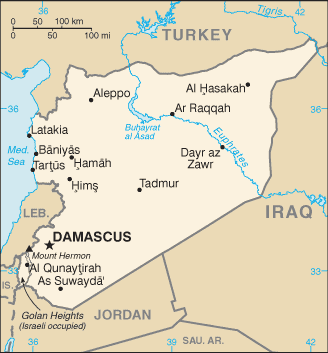 t the center of one of the bigger controversies was the “White Helmets” organization. Formerly known as the
t the center of one of the bigger controversies was the “White Helmets” organization. Formerly known as the




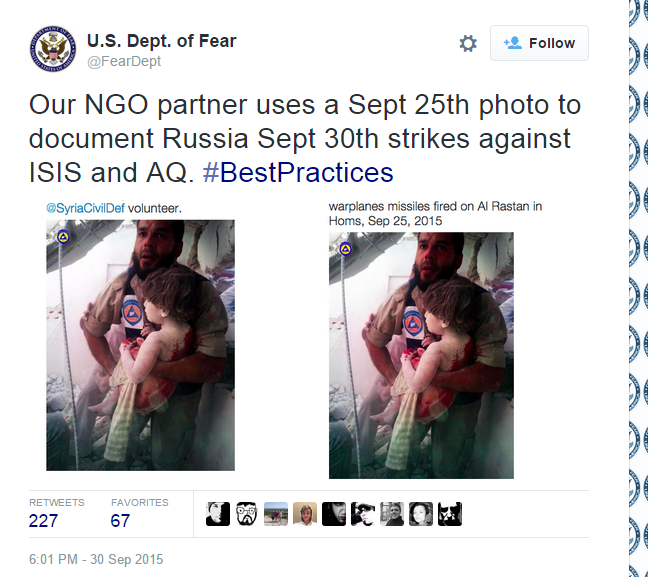


 “It’s all an information attack, a war, of which we’ve heard so many times,” she added.
“It’s all an information attack, a war, of which we’ve heard so many times,” she added.


